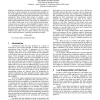Free Online Productivity Tools
i2Speak
i2Symbol
i2OCR
iTex2Img
iWeb2Print
iWeb2Shot
i2Type
iPdf2Split
iPdf2Merge
i2Bopomofo
i2Arabic
i2Style
i2Image
i2PDF
iLatex2Rtf
Sci2ools
ISCAS
2005
IEEE
2005
IEEE
Low energy asynchronous architectures
: Asynchronous circuits are often presented as a means of achieving low power operation. We investigate their suitability for low-energy applications, where long battery life and delay tolerance is the principal design goal, and where performance is not a critical requirement. Three existing adder circuits are studied — two dynamic and one based on pass-transistor logic. All adders combine dual-rail and bundled-data circuits. The circuits are simulated at a wide supply-voltage range, down to their minimal operating point. Leakage energy (at 0.18 m) is found negligible. Transistor count is found to be an unreliable predictor of energy dissipation. A set of the energy minimization rules is defined and two novel adders are proposed, based on these rules – a dynamic circuit and a passtransistor logic adder. The new adders consume less energy and achieve better performance, confirming the proposed concepts.
Related Content
| Added | 25 Jun 2010 |
| Updated | 25 Jun 2010 |
| Type | Conference |
| Year | 2005 |
| Where | ISCAS |
| Authors | Ilya Obridko, Ran Ginosar |
Comments (0)

